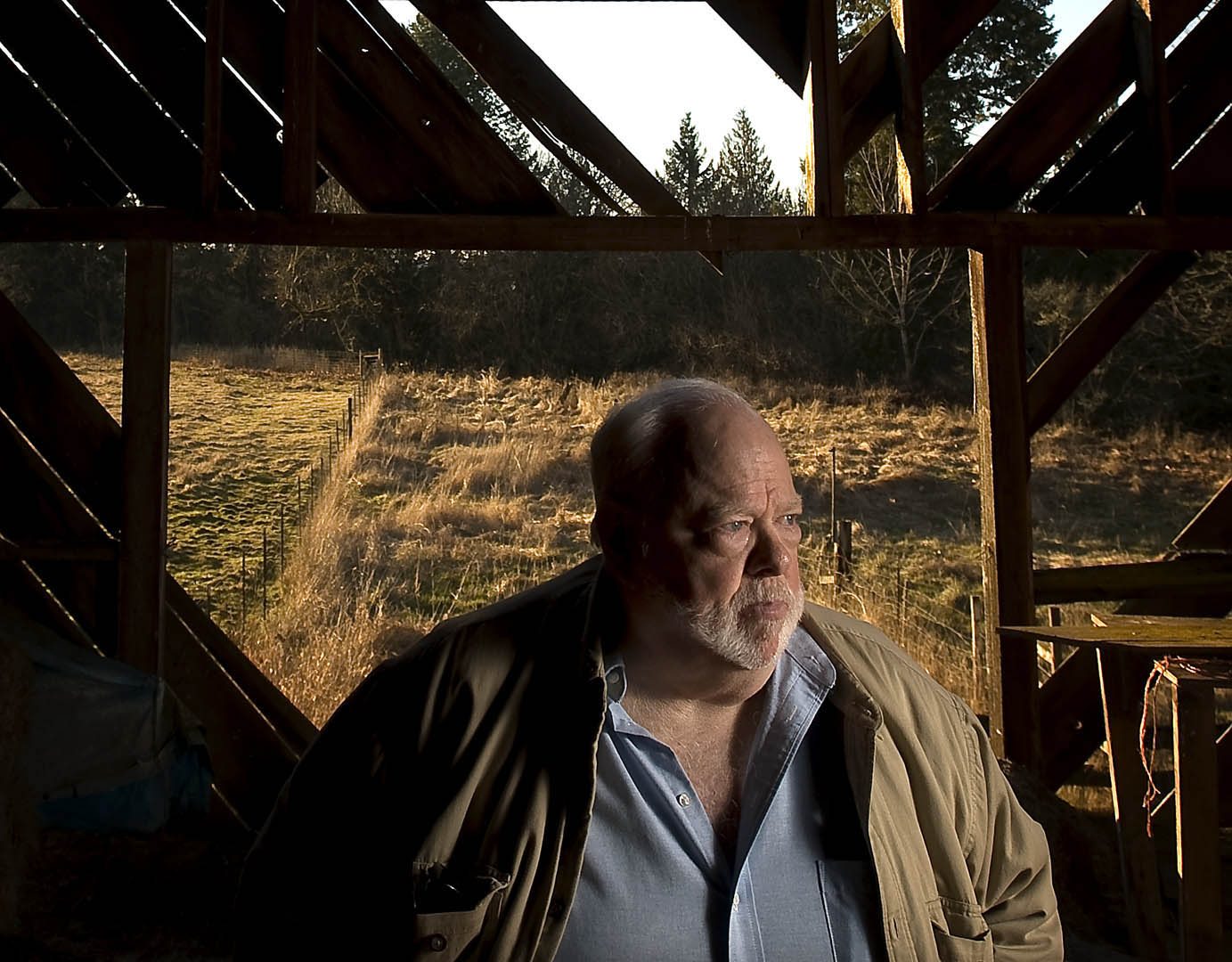Three years after the spectacular flame-out of the Bank of Clark County, its customers whose loans ended up in distant hands have mostly gone silent.
But on a quiet farm in Battle Ground, property rights advocate Chuck Cushman continues to wage a lonely battle on behalf of those property owners and others across the nation whose loans are now held by Rialto Capital Management, a subsidiary of Miami-based housing developer Lennar Inc.
Those borrowers, in many cases small-scale land developers who were overextended when the housing bubble burst, tell Cushman that Rialto is trying to squeeze them for money. Rather than working with the small-business owners, Cushman believes, Rialto seems bent on destroying them.
Cushman, founder and executive director of the American Land Rights Association, believes it’s only a matter of time until he’s able to galvanize political and public anger against Lennar. A veteran of countless property rights battles against government agencies, Cushman even believes his organization might force the Federal Deposit Insurance Corp. to change its handling of bank closures. Rep. Jamie Herrera Beutler, R-Camas, is among those who have joined Cushman in raising concern about the long-term fallout from the FDIC’s handling of the Bank of Clark County failure.
“We win about 90 percent of the time,” said Cushman, 68, during an interview in at his Battle Ground farm that also houses the association’s offices and a crumbling barn. “With Rialto, the odds against beating them are pretty significant. But we can inflict as much pain as possible.”
There are stirrings of political concern about FDIC’s response to bank failures. President Obama signed a bill this month that was introduced in Congress by Rep. Lynn Westmoreland, a Georgia Republican, requiring the FDIC’s inspector general to examine the agency’s loan-loss recovery practices. That study will take one year to complete, said Fred Gibson, the FDIC’s deputy inspector general. In addition, Gibson said, he launched an audit last fall of the FDIC loan sale to Lennar; it’s now under way.
Rialto’s parent firm, Lennar, would not comment for this article. But in a statement to The Columbian last March, Lennar spokesman Marshall Ames said Rialto is just doing its job.
“We are bound by the documents that each borrower entered into with their lender,” Ames said then. “If we fail to reach a settlement with a borrower, we rely on the remedies made available to us in that document struck between those parties at the time of origination.”
A messy action
State bank regulators shut down the Bank of Clark County three years ago Monday in the first wave of a continuing string of bank failures across the nation. The bank’s sudden demise was, by all accounts, a messy action, undertaken before the FDIC had smoothed out its procedures for transferring bank operations and assets to other financial institutions.
Oregon-based Umpqua Bank took over banking operations, but the FDIC held 149 of the failed bank’s loans. The FDIC agreed to short sales on a dozen of those loans. But 137 loans, with an unpaid balance of nearly $100 million, were bundled with loans from 22 financial institutions and put up for auction. In February 2010, Rialto paid $243 million for a 40 percent interest in that huge pool of loans, which had an unpaid principal balance of about $3 billion. The FDIC held the remaining 60 percent interest in those loans. As a result, the more money Rialto collects over seven years, the more money flows both to the company and the FDIC.
The FDIC’s most recent report, provided to The Columbian last week, shows the scope of the work left to be done. Rialto has foreclosed on more than one-quarter of the former Bank of Clark County loans, and another 11 borrowers have filed for bankruptcy. Owners of 56 loans categorized as “troubled” have negotiated changes in their payment schedules. Payments are up to date on 15 loans and 11 others are now off the books because properties have been sold through short sales or discounted payoffs.
The FDIC frequently enters into “structured transaction sales” with financial institutions, like it did with Rialto. They’re intended to tap private expertise to handle loan modifications and foreclosures while recovering as much money as possible to replenish the bank insurance fund. The FDIC considers such sales an important tool in keeping its fund healthy. While those dealings by definition are painful for those involved, they rarely stir major controversy.
But the FDIC’s dealings with Rialto have generated a smattering of negative publicity in small communities around the country, as well as in Atlanta, Ga., a city hard-hit by bank closures and the housing bubble. Developers and real estate attorneys complain privately that Rialto resorts to hardball tactics in negotiations.
Many of the loans being managed by Rialto are backed by land that was in some stage of residential development. And even though Rialto’s FDIC deal prohibits it from selling land to Lennar for development, Cushman and others suspect that Rialto’s dealings will benefit Lennar’s expansion as one of the nation’s largest residential developers. “They are putting their competition out of business,” Cushman argues. Adding to that suspicion is Lennar’s announcement last month that it was entering both the Seattle and Portland housing markets, which follows its move into the troubled Atlanta market in 2010.
Decades of battles
Cushman can recount decades of political battles that make clear that he’s rarely one to back away from a fight. He discovered Clark County two decades ago, and the name Battle Ground suited his vision of his work. He told his real estate agent to find him a farm, Cushman recalls. “I’ll turn it into the Valley Forge of the West,” he declared.
He’s battled against regulations to protect the Columbia River Gorge and scenic rivers that he deems excessive, and he helped fight lewd conduct charges against former Idaho Rep. Larry Craig in 2007. The son of a National Park Service official, Cushman cut his political teeth battling against the park service’s attempt to eliminate private cabins in Yosemite National Park. He still owns a cabin there.
He entered the less-familiar world of bank failures and loan losses at the request of desperate local developers, he says. Now, he says, they’ve asked him not to mention their names to The Columbian out of fear that any comments would antagonize Rialto. They fear that Rialto could take not only their land but any assets they used as collateral for their loans, he says.
“These guys are just scared to death, and they have reason to be scared,” he says. “All these guys are broke.”
The high point of public activism against the FDIC dealings with Rialto came in August, when the House Financial Services Committee held a subcommittee hearing about FDIC issues in suburban Atlanta. Cushman didn’t attend, but he said people with grievances against Rialto “hijacked” the hearing to get the attention of members of Congress.
Herrera Beutler has taken an interest in the issue and met with an FDIC official to express her concerns, said Casey Bowman, her communications director. While it appears that the FDIC’s sale of loans to Rialto did not violate any laws, Herrera Beutler “believes FDIC’s procedures are causing potentially unnecessary harm to places like Clark County and should be reviewed by Congress,” Bowman said in an email.
Cushman says it’s his job to build more support to help Herrera Beutler push the issue in Congress. He’s amassed a pile of correspondence from property owners, attorneys involved in battles with Rialto, and government officials. He says his emails have reached one million mailboxes, and that his shoestring organization has identified some 8,000 borrowers nationwide whose loans were acquired by Rialto,
But it’s a tough story to sell when those who stand to lose everything are unwilling to speak up, he concedes. “We have to find victims,” he said.
He plans to soldier on, knowing it won’t be easy. “I’m a fly speck on the back of an elephant,” he said.
Gordon Oliver: 360-735-4699 or gordon.oliver@columbian.com.




